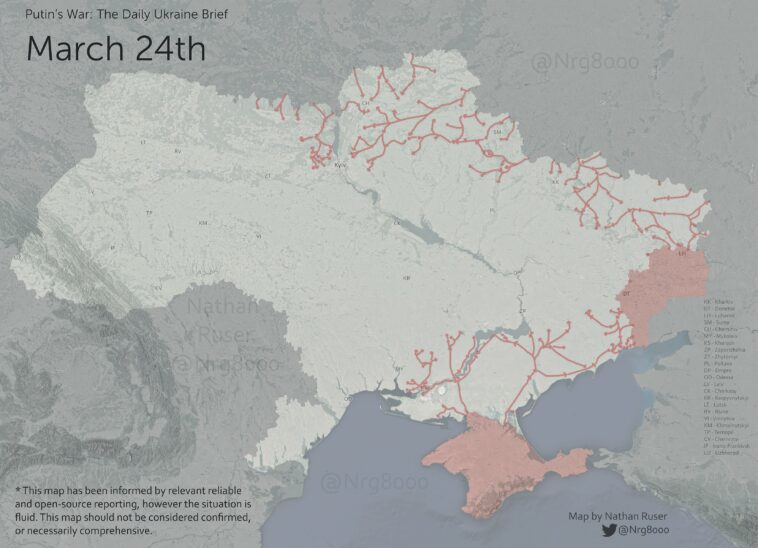NATO leaders summit. NATO will not send peacekeepers into Ukraine, NATO Secretary General Jens Stoltenberg said.
At the same time NATO pledged more support for Ukraine as President Zelenskyi addressed NATO leaders. One per cent of NATO’s aircraft and tanks would be enough to protect Ukraine and Europe from Russia’s aggression, President Zelenskyi said in his address ahead of the summit.
Russia’s aggression against Ukraine is the gravest threat to Euro-Atlantic security in decades, NATO leaders said in a statement. “We will work with the rest of the international community to hold accountable those responsible for violations of humanitarian and international law, including war crimes,” the statement reads. NATO will continue to counter Russia’s lies about its attack on Ukraine and expose fabricated narratives.
NATO expressed full solidarity with President Zelenskyi, the government of Ukraine, and with Ukrainians. “We reaffirm our unwavering support for the independence, sovereignty, and territorial integrity of Ukraine within its internationally recognized borders,” NATO leaders said in the statement.
NATO Allies will also continue to provide assistance to Ukraine in such areas as cybersecurity and protection against threats of a chemical, biological, radiological, and nuclear nature.
NATO called on China to abstain from supporting Russia’s war effort in any way, and to refrain from any action that helps Russia circumvent sanctions. “We are concerned by recent public comments by PRC officials and call on China to cease amplifying the Kremlin’s false narratives,” the statement reads.
Ukrainian Armed Forces destroy Russia’s warship, damage two other Russian vessels. The Ukrainian troops destroyed the Russian landing ship Orsk in the port of Berdyansk controlled by the Russians, the Ukrainian Navy said on March 24. Two other Russian warships, fuel tanks and ammunition caught fire. Deputy Defense Minister Hanna Malyar said on Ukrainian television that the military had hit a “huge target”, capable of carrying 20 tanks, 45 armored vehicles and 400 troops.
Explaining Ukraine podcast. One month of war: 10 lessons learnt
10 lessons we have learnt from one month of Russian invasion of Ukraine. About Ukrainian army, Russian army, Ukrainian society and national consolidation, Russian imperialism, West’s response, return of cruelty despite “technological progress”, and fragility of our civilization. We continue our “Explaining Ukraine” podcast by discussing horrible consequences of Russian invasion of Ukraine. Hosts: Volodymyr Yermolenko, analytics director at Internews Ukraine, and Tetyana Ogarkova, in charge of international outreach at the Ukraine Crisis Media Centre. Listen to the podcast.
Ukraine in Flames #14. Worse than ISIS: Russian attack on Ukrainian cultural heritage
UKRAINE IN FLAMES project is created by Ukraine Crisis Media Center, Ukrainian Catholic University’s analytical center and NGO “Euroatlantic Course”. We are aiming at searching a loud support for Ukraine in the war started by Russia on the 24th of February 2022.
“Any damage to cultural property, irrespective of the people it belongs to, is a damage to the cultural heritage of all humanity,”’– is stated in the Preamble of the 1954 Hague Convention.
Along with assault on civilian population, targeted destruction of the cultural heritage is another war crime that Russia intentionally commits against humanity and the Ukrainian people. As international diplomatic and cultural pressure to isolate Russia grows, preservation efforts on the ground are yet another frontline where operational and psychological pressure is mounting.
The sites that have already been damaged or completely destroyed are: Ivankiv Historical and Local History Museum, which stored paintings of Ukrainian artist Mariya Prymachenko, Holocaust memorial, located on the grounds of Babyn Yar, at least a dozen historically and culturally significant churches like Sviatohirsk Lavra and Dormition Cathedral, historical urban districts in Chernihiv and Kharkiv.
Thousands of cultural activists along with MCIP have already asked the international cultural community to impose cultural sanctions on Russia, including:
canceling all projects that involve Russia (including ones funded by Russia);
banning representatives of Russia from participating in international competitions (e.g., the Eurovision ban), exhibitions, forums, music and film festivals, and other cultural events;
removing Russian citizens from the supervisory boards and cultural partnerships, canceling sponsorships, and withdrawing organizational support;
eliminating coverage of Russian culture in the media.
Speakers:
Volodymyr Sheiko, director of the Ukrainian Institute
Olesya Drashkaba, Ukrainian artist, editor at the UChoose critical thinking initiative of Ukraine Crisis Media Center
Olha Honchar, director of the Museum of Terror. Lviv.
Georgiy Kasianov, professor at Marie Curie-Sklodowska University. Lublin, Poland.
Volodymyr Boiko, historian, expert on the local development strategies. Chernihiv.
Serhii Lepiavko, doctor of historical sciences, professor, member of the Armed Forces of Ukraine. Chernihiv.
If you want to support Ukraine against Russian aggression, check the link with recommendations by Ukraine Crisis Media Center – https://uacrisis.org/en/help-ukraineNGO Euroatlantic Course collects donations to support Ukrainian Army and civilians – https://eac.org.ua/en/main-page/




